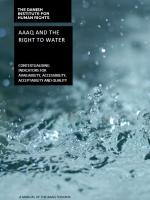
The AAAQ Manual and the Right to Water - contextualising indicators
A human rights based approach to development has gained a prominent role in the socio-economic development of countries around the world and the agenda for the development and realisation of the Sustainable Development Goals. Meanwhile, the challenge remains of translating the international human rights instruments and normative values into a model for development with a clarified methodology, analytical concepts and policy options. All involved actors need to know and understand what the right to an adequate standard of living means and how this can be achieved.
This Manual guides the reader through a process of developing an indicator-framework for the right to water in national, local and project level context.
The key aims of the Manual are:
- To raise awareness of international human rights standards for the right to water and the human rights based approach
- To analyse the right to water within a specific geographic, economic, social, cultural and political context
- To develop a set of specific indicators for assessing the level of realisation of the right to water and human rights principles of equality and non-discrimination, participation and accountability in the water sector
Also read: The AAAQ Framework and the Right to Water - international indicators and AAAQ & sexual and reproductive health and rights.
This paper is part of the DIHR AAAQ (Availability, Accessibility, Acceptability and Quality) Toolbox that aims to support the operationalisation of the rights to water, sanitation, food, housing, health, and education.
Designed as a multi-stakeholder approach, the AAAQ Toolbox offers common methodologies for all stakeholders as well as tailored tools for states, rights-holders, business, civil society and National Human Rights Institutions (NHRIs).
We strive to make the pdf versions of our publications etc. accessible for screen readers. If you experience any problems, please contact Digital Editor Stine Juhl Nielsen on stni@humanrights.dk
